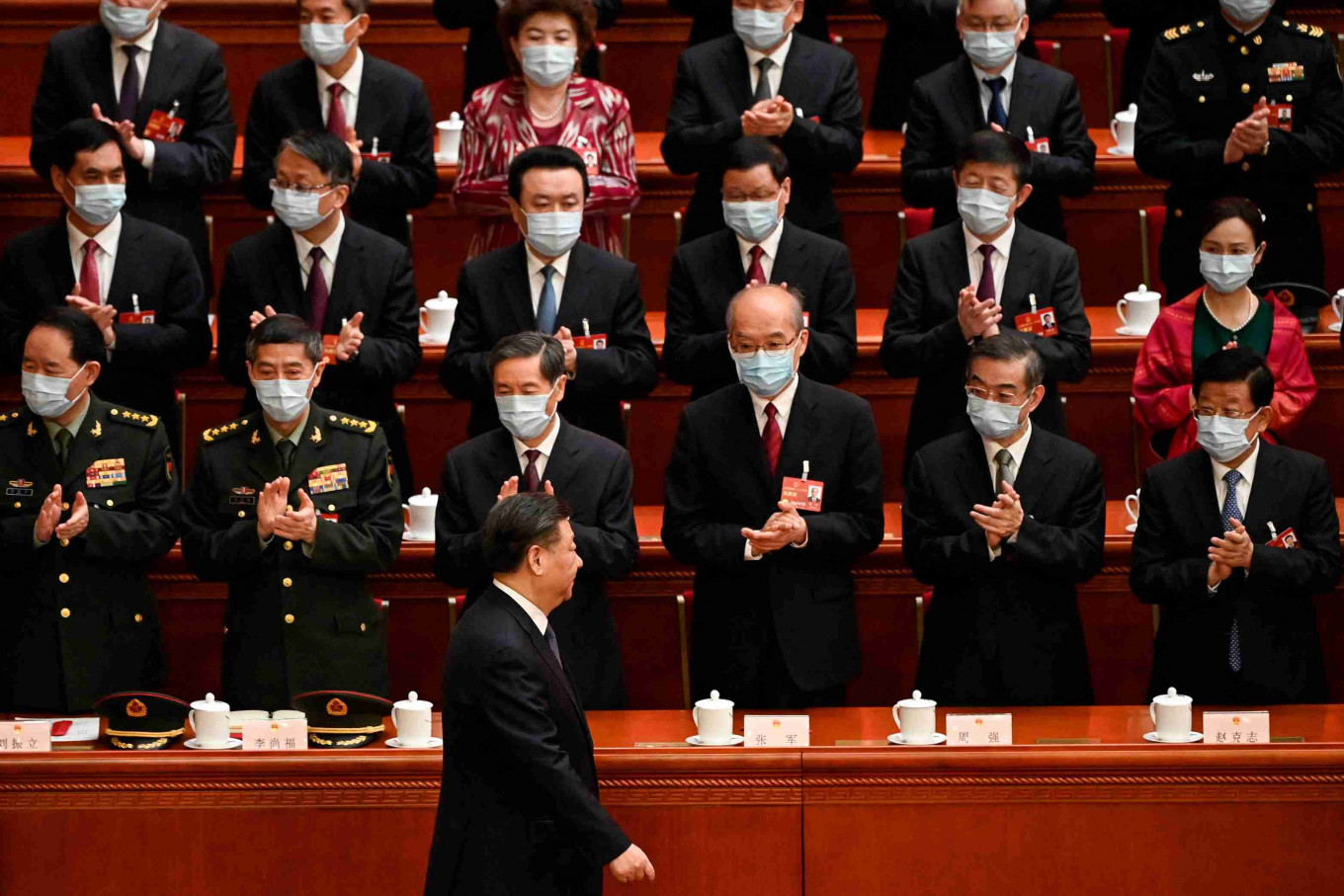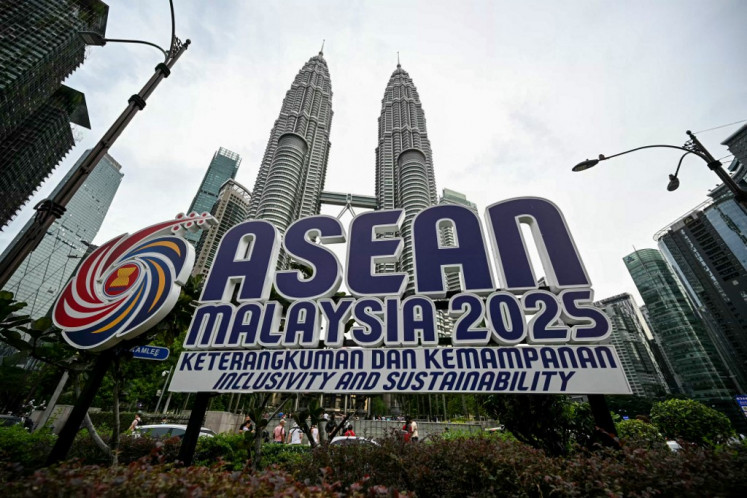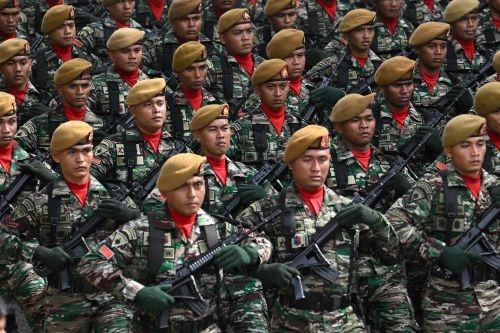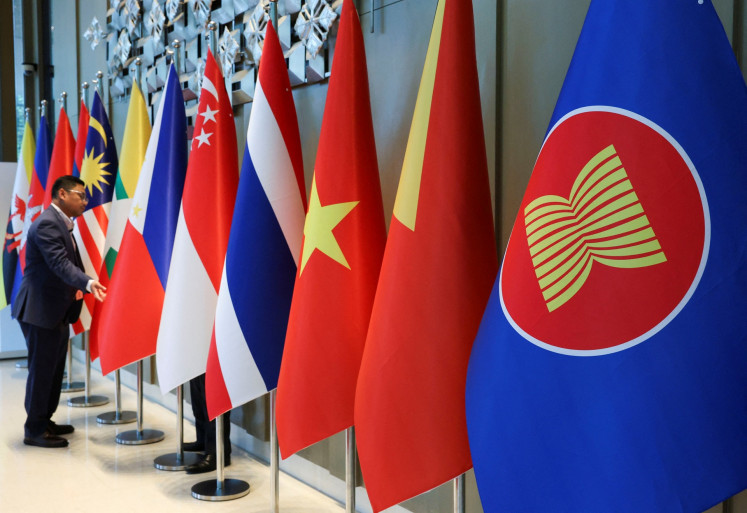Xi’s enduring reign could be a boon, but Indonesia must beware
The reappointment of Xi Jinping as Chinese president has garnered praise from the country’s international beneficiaries, not least from Indonesia, which analysts believe would stand to gain from the strongman’s continued reign over China.
Change text size
Gift Premium Articles
to Anyone

C
hina’s reappointment of Xi Jinping as president and its surprise diplomatic salvo to broker peace between Iran and Saudi Arabia has garnered praise from the country’s international beneficiaries, not least from Indonesia, which analysts believe would stand to gain from the Chinese strongman’s continued reign.
President Joko “Jokowi” Widodo was quick to congratulate Xi on his record third appointment on Friday, taking to Twitter to heap praise on the leader of one of Indonesia’s top economic partners and express the his eagerness to continue cooperating with Beijing.
“As […] strategic partners, let us continue to further strengthen our cooperation for the prosperity of both countries & continue our contribution for regional peace and stability,” Jokowi tweeted on Saturday.
The Indonesian leader also congratulated Xi’s close ally, 63-year-old Li Qiang, who was appointed the new Chinese premier, effectively giving him responsibility for managing Beijing’s economy and relevant partnerships. Li replaces Jakarta’s previous point of contact with Beijing, Li Keqiang.
“I look forward to working closely with you in enhancing our long-standing friendship and cooperation for the benefit of our two peoples as well as the region and beyond,” Jokowi tweeted, addressing Li.
Xi’s third term as Beijing’s number one man was evidence of both his domestic and global power, Indonesian analysts said on Monday, noting that his vigorous disposition would continue to offer opportunities and challenges for the world.
For Indonesia in particular, which has cooperated closely with China in economic projects, Xi’s enduring reign could be good news, although the experts also warned that neutrality remained the best policy.
China is Indonesia’s biggest trading partner, posting Rp 2 trillion (US$130 million) in 2022, according to data from the Foreign Ministry. China is also the nation’s second biggest investor, having funneled $8.2 billion into projects last year, mostly linked to China’s Bridge and Road Initiative.
More assertive
In a historic event on Friday, Xi secured yet another five years of primacy at Beijing’s Great Hall of the People, the same day that China announced it had brokered a peace between fierce rivals Iran and Saudi Arabia.
Indonesia acknowledged the diplomatic achievement, with the Foreign Ministry welcoming the deal to restore relations between the two countries and expressing hope “that this will contribute to peace and stability in the region”.
“Indonesia believes dialogue and cooperation are the best way to address any issues,” the ministry tweeted on Sunday.
The turn of events has been taken by keen observers as a broader sign of a changing world order, wherein the United States is no longer the unchallenged global superpower.
In Southeast Asia, states have strengthened ties with Beijing primarily for economic reasons.
“It is my understanding that one of China’s primary priorities domestically is to secure its foreign policy, especially for economic cooperation like the Belt and Road Initiative,” said Dafri Agussalim, an international relations expert at Gadjah Mada University (UGM).
“Indonesia, as one of the partners, would be positively affected by Xi’s reelection in a significant way,” he added.
A global shift
Xi’s reelection has also been noted as indication of a more assertive Beijing, with many observers taking note of the new 24-character phrase the Chinese leader adopted last week that appears to redefine China’s foreign policy principles.
The Chinese phrase includes a commitment to “be proactive, achieve things, unite and dare to fight”, which stands in contrast to that of former Chinese Communist Party (CCP) chairman Deng Xiaoping’s maxim of “be good at maintaining a low profile [and] never claim leadership”.
Dewi Fortuna Anwar, a senior international relations expert at the National Research and Innovation Agency (BRIN), told The Jakarta Post that China’s ability to resurrect Saudi-Iranian diplomatic relations was a promising sight for its growing presence on the world stage.
“While I think it was a very pragmatic move on the Saudis’ part, I think we should congratulate China and give it credit. Hopefully, Beijing will be able to solve the conflicts in the hotspots in the Middle East,” she said on Monday.
The East Asian giant has been cultivating ties across different regions amid efforts from the West to discredit its work, including in the Middle East, where the US was traditionally seen as the only viable partner for states in and around the Gulf and the Arabian peninsula.
But with Washington’s poor relations with Iran, its support of Israel and conditional support for Saudi Arabia, analysts believed that China was in a good position to broker an agreement that could reduce regional tensions.
China’s senior diplomat, Wang Yi, had said Beijing would continue to play a constructive role in handling hotspot issues and demonstrate responsibility as a major nation.
In Southeast Asia, China’s outsize influence has mostly held up due to robust economic linkages, but Beijing has also faced constant pushback from various ASEAN member states for its sweeping claims to the resource-rich but contested waters of the South China Sea.
For its part, Indonesia has walked the tightrope between exercising its sovereign rights, taking China’s money and appeasing the US as a strategic partner in the region.
“The US has been Indonesia’s ultimate security guarantee for a long time, even before China began to be an active player,” Dewi asserted, noting that US-Indonesian security cooperation had expanded apace in recent years.
“It has always been important, and it will remain as such.”
And while China has been a crucial market for Indonesia and has given much help with fewer conditions than the West, Dafri predicted, “Indonesia’s balancing act will likely continue.
“Some enmity toward Beijing is still present, be it fear or suspicion,” the analyst said.
Until China could resolve some of its most pressing international issues, especially the South China Sea dispute, there would be little prospect of the dynamics changing, the analysts concurred. (tjs)









